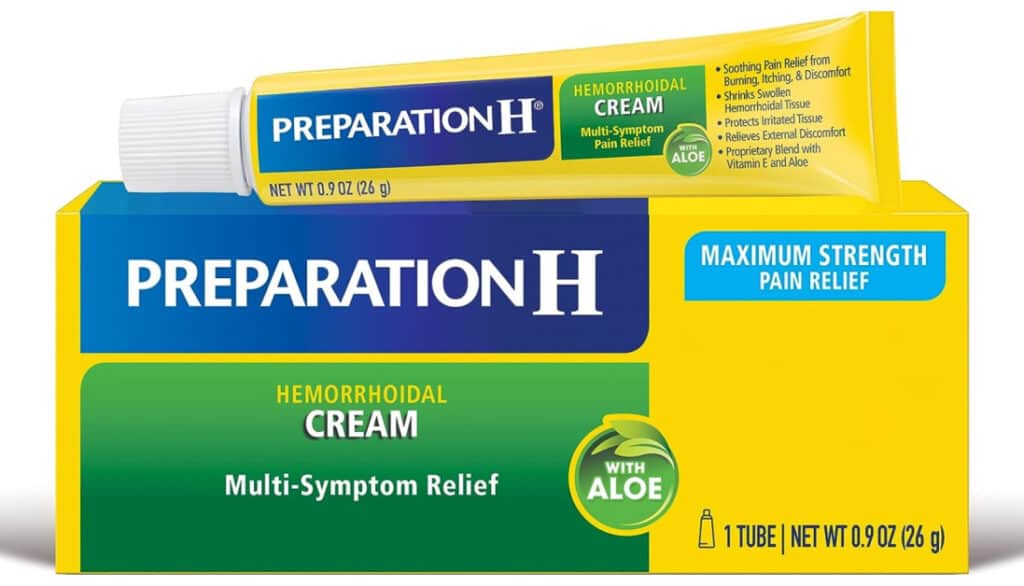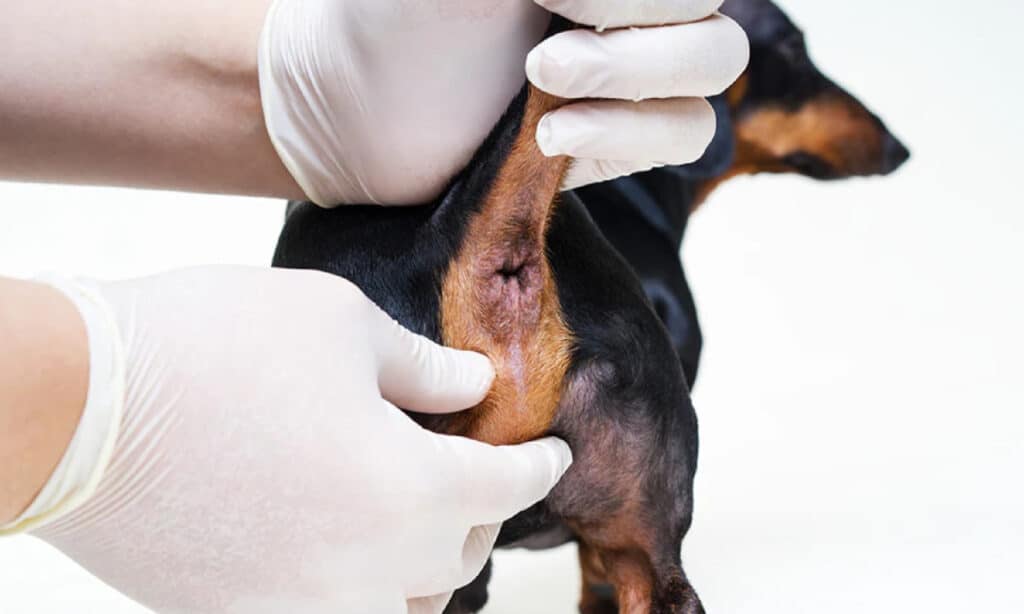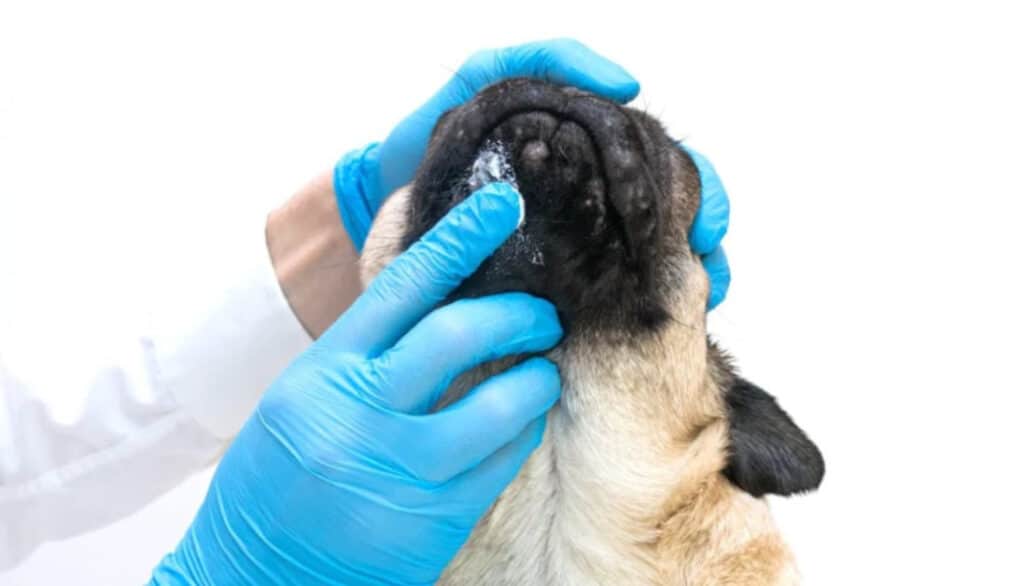Pet owners often go to great lengths to ensure their furry friends are comfortable, healthy, and pain-free. So when we notice our dogs suffering from skin irritations, inflammations, or other similar conditions, our instinct is to reach for a solution, even if it means considering products meant for humans.
Preparation H, a well-known remedy for various human ailments, is one such product that many dog owners ponder about. However, before you pop open that tube of ointment and apply it to your canine companion, it’s crucial to understand its implications. This article delves into the specifics of Preparation H, its potential effects on dogs, and what experts have to say about its off-label use. Let’s guide you through a comprehensive look at this topic, ensuring your pup gets the best and safest care possible.

What is Preparation H?
Preparation H is one of those products that has, over time, become almost a household name. Especially in homes where comfort from certain, often unspoken, ailments is sought. Originating as a treatment specifically designed for hemorrhoids in humans, this ointment has been a trusty companion for many looking to find relief from itching, burning, and swelling in rather delicate areas.
The magic of Preparation H largely lies in its ingredients. Depending on the specific formulation you pick up from the store, it might contain ingredients ranging from witch hazel, which acts as an astringent, to hydrocortisone, aimed at reducing itching. Other components can include phenylephrine, which helps constrict blood vessels, thereby reducing swelling, and petrolatum or mineral oil, which offer a protective barrier and moisturizing effect.
However, it’s not all science-y jargon with Preparation H. In layman’s terms, it’s like that soothing balm that cools and protects irritated skin, bringing a much-needed sigh of relief. But while its effects on human skin are widely acknowledged, what does it mean for our four-legged friends? Let’s dig a little deeper to understand if and how dogs fit into the Preparation H narrative.

Common Reasons People Consider Preparation H for Dogs
If you’ve ever had a dog that seems to be in discomfort, you’d know the feeling all too well— that rising anxiety mixed with a sense of urgency to find a solution. Many pet parents have wondered if Preparation H, the same ointment they trust for their own aches, can be used on their furry pals. Here are some common reasons that prompt this consideration:
- Anal Gland Issues: Just reading the phrase might make a few of us cringe, but it’s a real concern for many dogs. When a dog’s anal glands don’t empty properly, it can lead to discomfort, itching, and even swelling. That scooting behavior you sometimes see? Yep, that’s a classic sign of anal gland problems.
- Skin Irritations and Itchiness: Just like us, dogs can develop irritated skin from a range of causes, be it allergies, insect bites, or just dry skin. The persistent scratching or licking at a particular spot? It’s their way of saying, “Hey, this itches!”
- Swellings and Inflammations: Dogs are adventurous, and with adventure sometimes come minor injuries. Bumps, scrapes, and other swellings can make any pet parent consider reaching for something soothing, like Preparation H, to reduce the swelling and provide relief.
- Other Minor Skin Issues: This can include things like insect bites, rashes, or small wounds. The idea here is often to provide a protective barrier while offering some relief from the irritation.
It’s completely natural for us to want to ease any discomfort our pets are experiencing. After all, they’re part of the family. However, the key question remains: is Preparation H a safe go-to solution for these concerns?

Potential Risks of Using Preparation H on Dogs
We’ve all been there, in that well-meaning place where we want to use whatever we have at hand to help our furry friends. After all, seeing our pets in discomfort can tug at our heartstrings. But when it comes to applying our human solutions to canine concerns, caution is the word. Let’s break down the potential risks associated with using Preparation H on our dogs:
- Ingestion Risks: If there’s one thing dogs are famous for, it’s their insatiable curiosity—often expressed through licking. If you apply Preparation H to an area within their reach, there’s a good chance they’ll give it a good lick. And while the ingredients may be safe for topical human use, they might not sit well in a dog’s stomach.
- Possible Side Effects: The ingredients in Preparation H are designed with humans in mind. For dogs, these same ingredients could lead to skin reactions, rashes, or even more severe complications, depending on their individual sensitivities.
- Allergic Reactions: Just as humans can have allergies, so can our pets. Ingredients like phenylephrine or even the preservatives in the ointment could potentially cause an allergic reaction, leading to even more discomfort for your pup.
- Delayed Proper Treatment: Sometimes, reaching for a quick fix can delay seeking the right treatment. By trying to soothe a symptom with Preparation H, you might miss out on treating an underlying condition that requires a vet’s attention.
- Masking Serious Issues: If an issue seems to be alleviated momentarily by the ointment, it might mask more significant concerns. A dog might have a deeper skin infection, internal issue, or other conditions that need a different approach.
The urge to help, to do something immediate when our pets seem uncomfortable, is deeply human. But as with all things concerning those we love, it’s essential to be informed and take the safest path.

Safe Alternatives to Preparation H for Dogs
Every pet parent’s goal is to ensure their fur-baby’s comfort without compromising their health. While Preparation H might not be the safest bet for our canine companions, there’s no need to fret! The good news is that there are several dog-friendly alternatives out there designed specifically with our pups in mind. Let’s dive into some of these alternatives:
- Vet-Approved Creams and Ointments: Many veterinary clinics carry or can recommend specific ointments tailored for dogs. These products take into consideration a dog’s unique physiology and typical behaviors.
- Natural Home Remedies: Some natural remedies can help alleviate minor skin irritations. Aloe vera, for example, is known for its soothing properties. But, a quick note: always ensure any natural remedy is dog-safe.
- Witch Hazel: A natural astringent, witch hazel can help reduce swelling and inflammation. It’s often recommended for minor skin irritations in dogs, but be sure to opt for an alcohol-free version to prevent drying out your dog’s skin.
- Oatmeal Baths: Oatmeal has long been praised for its soothing effects on itchy skin. If your dog is scratching away, consider giving them a gentle oatmeal bath. There are even dog-specific oatmeal shampoos available.
- Coconut Oil: This multipurpose oil can act as a moisturizer and can help soothe minor irritations. However, use it sparingly, as too much can lead to a greasy coat and potential over-licking by your pup.
- Hydrocortisone Creams for Dogs: These can help reduce inflammation and itchiness. Still, it’s essential to ensure you’re using a dog-safe version and follow the recommended dosage.
While all these alternatives sound promising, the golden rule remains: always consult with your veterinarian before trying out any remedy, be it store-bought or homemade. Our pups rely on us to make the best choices for them, and sometimes, the best choice is to seek expert advice.

Tips on Preventing Ailments that Lead to Considering Preparation H
As the old saying goes, “prevention is better than cure.” And isn’t that the truth, especially when it comes to our beloved fur-babies? As pet parents, we’d rather not see our dogs in any discomfort to begin with. So, let’s chat about some handy tips to prevent those pesky ailments that might make you even consider reaching for that tube of Preparation H:
- Regular Grooming: Just like we feel good after a spa day, regular grooming can work wonders for our dogs. It helps identify potential issues early on, keeps their coat clean, and prevents skin irritations.
- Balanced Diet: A good diet isn’t just for us humans trying to keep in shape. Feeding your dog a balanced, nutrient-rich diet can improve their skin health, boost their immune system, and keep many ailments at bay.
- Hydration, Hydration, Hydration: Ensure your dog always has access to fresh water. Hydrated skin is healthier and less prone to drying out and becoming irritated.
- Regular Vet Visits: Regular check-ups aren’t just for when something’s amiss. Routine vet visits can catch potential issues before they become significant problems.
- Pest Prevention: Fleas, ticks, and other little critters can cause a world of discomfort for your pup. Regularly using preventive treatments can keep these pests away and prevent associated skin irritations.
- Safe Play: While we can’t keep our dogs in a bubble, ensuring they play in safe environments can reduce the risk of injuries. Regularly check your backyard for any sharp objects or irritants.
- Know Your Dog: Each dog is unique. By understanding their sensitivities, allergies, and specific needs, you can tailor their care and environment, ensuring they stay ailment-free.
Caring for our dogs often mirrors caring for ourselves. By taking a proactive approach to their well-being, we can ensure our pups are happy and comfortable.

Conclusion
In the winding journey of pet parenthood, every choice we make echoes our undying love and commitment to our four-legged family members. From those sneaky table scraps we occasionally slip (even though we swear we won’t) to the nights spent Googling remedies for their slightest discomfort, it’s clear: we just want the best for our fur-babies.
So, when we find ourselves in the pharmacy aisle, holding a tube of Preparation H and wondering if it’s the answer to our dog’s woes, it’s all coming from a place of love and concern. But as we’ve journeyed through this article, it becomes evident that our good intentions should always be backed by knowledge and expert advice. There are numerous dog-specific treatments and preventative measures available that can help our pets without risking potential harm.
The path to being the best pet parent isn’t always straightforward, filled with its quirks and questions. But by staying informed, leaning on expert advice, and always keeping our dog’s best interests at heart, we ensure they lead the happiest, healthiest lives by our sides. Here’s to many more tail wags, belly rubs, and joy-filled days with our canine companions! 🐾

Frequently Asked Questions (FAQs)
While some pet owners have considered using Preparation H for anal gland issues, it’s not specifically formulated for dogs. Before applying any product, it’s crucial to consult with a veterinarian to ensure it’s safe and appropriate for your pet’s specific needs.
Dogs have a natural instinct to lick, especially when something new is applied to their skin. If a dog ingests a small amount of Preparation H, they might experience digestive upset. However, in larger quantities or for sensitive dogs, there could be more pronounced reactions. If you suspect your dog has ingested a significant amount or if they’re showing any signs of distress, contact your vet immediately.
Signs of an allergic reaction in dogs can include excessive itching, redness, swelling, hives, or even difficulty breathing in severe cases. If you notice any of these symptoms after applying a product, wash the area thoroughly and seek veterinary attention.
While there are several natural remedies, like aloe vera or oatmeal baths, that can provide temporary relief, it’s essential to ensure any remedy you consider is dog-safe. When in doubt, or if the irritation persists, consulting with a veterinarian is the best course of action.
It’s generally recommended to have at least an annual check-up for adult dogs. Puppies, senior dogs, or dogs with known health issues might require more frequent visits. Regular check-ups can catch potential problems early, ensuring your pet remains in the best possible health.
